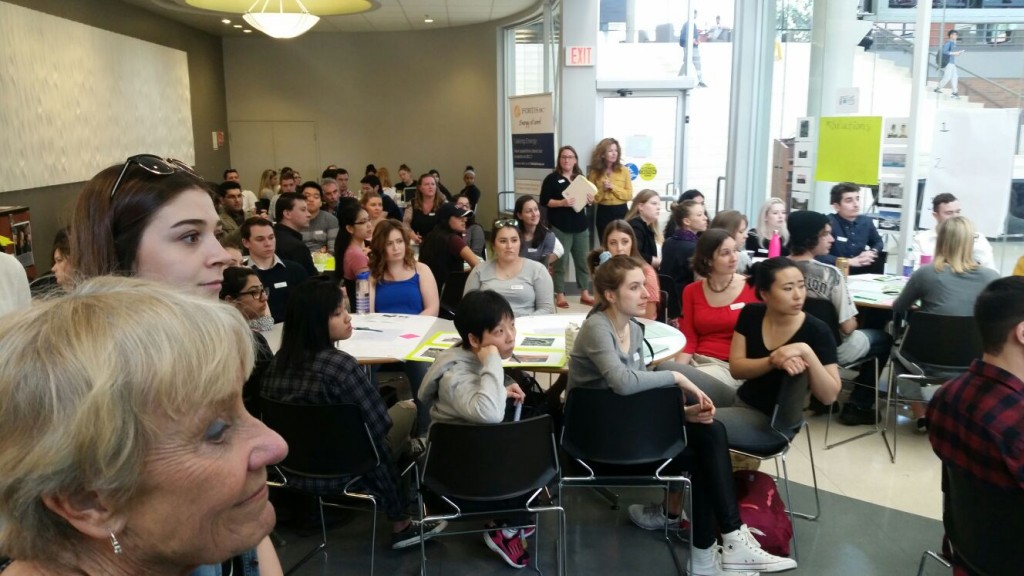The Canadian Federation of Students’ campaign comes to Douglas
By Julia Siedlanowska, Staff Writer
Squash the Squeeze is a provincial campaign launched by the Canadian Federation of Students (CFS) BC division to reduce student debt.
On February 17, the CFS had a table set up in the concourse at Douglas College’s New Westminster campus, offering students an opportunity to sign a petition to BC’s Minister of Advanced Education, Amrik Virk. Postcards with the words “Hey minister, we need to talk…” were also made available with the intention of being sent to the minister along with a personalized message from each student.
“Squash the Squeeze started because students from across the province were sick of feeling the squeeze of student debt,” says Jenelle Davies, chairperson for CFS-BC. “We find that we’re paying more and more for our education each year and receiving less and less.”
BC’s national representative from the CFS, Zachary Crispin, was also present at the event.
The goals of the Squash the Squeeze campaign are to reduce tuition fees, bring back provincial grants, increase funding for post-secondary institutions, and eliminate interest on Canada student loans.
“We have the most debt in the country. $35, 000 is the average student debt in BC, which is higher than the national average,” says Davies.
In addition to reducing tuition, one of the initiatives that the CFS wants to see come out of the Squash the Squeeze campaign is the reintroduction of grants programs so that students, according to Davies, “aren’t starting their life after graduation saddled with so much debt.”
Currently the only grants available to BC students are through the federal government. Davies mentioned that many of these grants were for $1,000 and were not enough to cover tuition for one semester at Douglas College, nor at any other institution.
The third goal of Squash the Squeeze is to increase funding for post-secondary education. “The majority of folks in the community and the province believe that education is something that is valuable and that the most people possible should be able to access it, but we can’t do that if we won’t fund our institutions,” says Davies.
The fourth and final goal of the campaign is to eliminate interest on student loans and stop the government from making money off struggling students. “Right now the government actually makes a profit off student loans,” says Davies. “The only people that are able to get student loans are the people that desperately need it because there is no other option, and to make profit off the people that are in the lowest income bracket, off students, is ridiculous. We would like to see the government stop doing that.”
As part of an ongoing campaign by the CFS, the aim of the Squash the Squeeze campaign is to give a face to the movement to reduce student debt in the province. Students took photos next to the table holding a sign that read “My squeeze means…” and filling in what the cost of tuition and funding cuts meant to them. These photos were then to be posted to Twitter with the hashtag “#SquashTheSqueeze.”
“We want to really personalize this campaign and let the government know this isn’t just a faceless body of students. We all have stories and we all struggle…” says Davies.
Sam Hahn, a student at Douglas College completing his diploma in theatre, said, “I think, flatly speaking, that it needs to be recognized that education is what makes countries happy. You look at the most educated countries in the world—they pay no tuition and they are often the happiest countries in the world. When we begin to see that an educated populace is a happy populace then hopefully tuition will go down. That’s the idea.”
Hahn also added, “But I think that nobody is making any money by having tuition fees go down and so because of that, especially in North America where we are extremely capitalist and quite right-wing, I don’t think it’s going to happen soon.”
International student Zulia expressed her struggle saying, “I already paid $6,000 [for my semester] and I have to pay taxes and I cannot work [for the first] semester, so [I] cannot even pay for my own education, my parents have to do it.”



